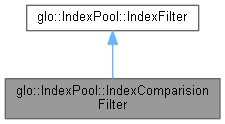|
GlobalObjects
|

Filters can be assigned to objects of the type ObjectStrIndexIterator, which control the iteration by an ObjectStrIndex.
With this structure, a filter can be defined using "<", "<=", ">", ">=", "==" and "!=". For example, if m_sIndexFilterValue has the value "123" and m_eComparisionOperator has the value GREATER_EQUAL, only all objects with an index greater than or equal to "123" will be filtered out.
More...
#include <GloIndexPool.h>

Public Member Functions | |
| IndexComparisionFilter () | |
| virtual | ~IndexComparisionFilter () |
 Public Member Functions inherited from glo::IndexPool::IndexFilter Public Member Functions inherited from glo::IndexPool::IndexFilter | |
| virtual | ~IndexFilter () |
Public Attributes | |
| EnComparisionOp | m_eComparisionOperator |
 Public Attributes inherited from glo::IndexPool::IndexFilter Public Attributes inherited from glo::IndexPool::IndexFilter | |
| std::string | m_sIndexFilterValue |
Filters can be assigned to objects of the type ObjectStrIndexIterator, which control the iteration by an ObjectStrIndex.
With this structure, a filter can be defined using "<", "<=", ">", ">=", "==" and "!=". For example, if m_sIndexFilterValue has the value "123" and m_eComparisionOperator has the value GREATER_EQUAL, only all objects with an index greater than or equal to "123" will be filtered out.
|
inline |
The default constructor to initialize members.
References glo::EQUAL, and m_eComparisionOperator.
|
inlinevirtual |
A virtual destructor makes the structure to a polymorphic structure.
| EnComparisionOp glo::IndexPool::IndexComparisionFilter::m_eComparisionOperator |
The comparison operator.
Referenced by IndexComparisionFilter().